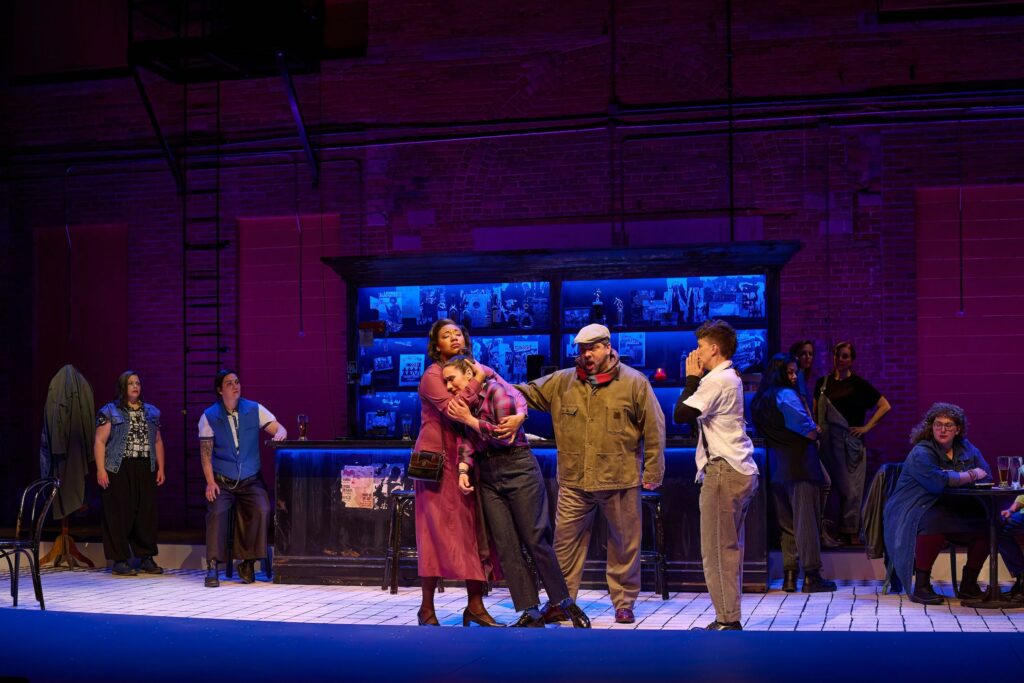Notes from Row G, centre, COC Theatre:
Asymmetrical allegory
Pomegranate, the remounted, by now iconic, lesbian-themed chamber opera first presented by Buddies in Bad Times Theatre in June 2019, unveiled in newly expanded musical form last weekend by the Canadian Opera Company, takes as its overarching structural premise the notion of twin settings populated by parallel narratives. A tale of both intimate and cataclysmic proportions centred on the eruption of Mount Vesuvius in 79 AD and subsequent destruction of Pompeii is more than faintly mirrored by the vastly more recent Toronto Bathhouse Raids of 1981. The narrative architecture as envisioned by composer Kye Marshall and librettist Amanda Hale is a precarious balance of atmosphere and subtext. An asymmetrical allegory, the lives of two young lovers, Suli/Suzie and Cassia/Cass, doubled by the same two singer-actors, Pomegranate builds on a common foundation. The notion of sanctuary — Home, sweet home/A place where we can be together, as a worshipful chorus of loving followers of Isis intones — is rendered hugely ironic. A centurion sent by the Emperor Titus bursts into the temple, sword drawn, intent on ending the women’s ecstatic, Dionysian-inspired rituals. Toronto police forcibly arrest 300 gay men, corralling them en masse in a local detention centre. Bathhouse owners are charged with operating common bawdy houses. Vesuvius rumbles. A homophobic mob roars outside Cass and Suzie’s refuge in the Fly By Night bar — a real-life landmark of the day. The alignment of A and B stories here, though occasionally strained, is as outsized — even hyperbolic — as it is dramatically striking.
Fast forward to the past
We begin, not at the beginning, but at a desolate gap in time. Act I. Cass (Danielle Buonaiuto) and Suzie (Adanya Dunn) have parted, wrenched apart by Suzie’s moralizing, over-reaching uncle (Peter Barrett) and led away by her distraught widowed mother (Catherine Daniel). Life weighs heavily on Cass. I walk these busy streets alone, she grieves, lost in thought, an unrelenting sense of abandonment all but crushing her. A torrent of memories surges through her mind. Her imagination seizes control. Fast forward to the past. Pompeii. She and Suzie are there. Teenagers on a remembered school trip abroad. The pair immediately connects. Reality becomes increasingly disjointed. The frozen plaster forms of two young women, ancient lovers locked in an eternal ashy embrace — Cassia and Suli. Suzie and Cass. Together. Forever. History is transformed, personalized, captured in close up — a highly effective piece of theatrical magic. Act II is considerably more constrained. Less romantic period piece, more domestic drama, albeit housed in a bar. Jules (Teiya Kasahara), the protective street smart proprietor of the Fly By Night with a bartender’s classic heart of gold. A high-spirited assortment of incorrigible, fun-seeking lesbian patrons. And Suzie and Cass. An extended family of tightly bonded characters elliptically revealed, the flip side of the here and now, access to kinship via one of set designer’s Lorenzo Savoini’s symbolic, faux masonry Roman doorways. Time never tracks in a straight line in Pomegranate. Action, on the other hand, still flows from consequence as in all good stories.
Changes of tune
Lush, sensuous and lyrical; snappy, sinewy and gritty — composer Marshall’s music betrays an abundantly evident fondness for eclecticism, her score for Pomegranate both highly coloured and compelling, Acts I and II strictly distinguished one from another by sweeping shifts in style and harmony. Cassia and Suli’s Pompeian love affair is awash with classicism — rippling harp arpeggios, woodwinds tracing lustrous figures, strings murmuring in thoughtful discourse, urgent brass trumpeting punctuation. Conversely, Cass and Suzie’s relationship is all hot jazz and catchy, up-tempo rock accented by pops of salsa and soulful urban blues. Edgy, often disorienting, Marshall’s music completely enthralls with its frequent, emotionally-charged changes of tune. The sonic equivalent of highlighted text, player numbers virtually tripled since Pomegranate’s original iteration, instrumentation vastly expanded. A chorus of six, an altogether new addition to Pomegranate II, provides added texture to the opera’s current, unexpectedly sprawling compositional fabric. Conductor Rosemary Thomson leads with a fine ear for detail.
A brave undertaking
Singers face more than a few formidable proficiency tests during the course of Pomegranate’s slightly over 2-hour running time, not the least of which results from the opera’s stratospheric tessitura. Principals are particularly effected, compelled to perform at maximum throttle, upper registers fully engaged, from lights up to blackout, soaring into the unforgiving realms awaiting them beyond B♯ with not infrequent excursions into positively daunting E♭ territory. Maintaining power and control is a more or less constant challenge. Parlando, too, is under threat. Sung speech is a tricky proposition at the best of times, but Pomegranate demands a singularly commanding level of technical skill, an ability to unpack text at extreme levels of high note pressure. Dunn and Buonaiuto are masters. Kasahara, as well, limited opportunity to solo notwithstanding. Granted, there are problems of clarity at play here from a listener point of view. Nuances of characterization and scena, indeed even broad strokes of story, all too often tend to go unheard and/or prove difficult to discern. The COC Theatre, a cavernous, repurposed late 19th century industrial space, is decidedly singer unfriendly. Acoustics are beyond problematic. And yet, somehow, Pomegranate still carries the day. The energy, the passion, the love and the pain generate an emotional force field of vivid dimensions, palpable, intense. A brave undertaking on the part of the COC. A deeply meaningful launch to Pride Month long and loudly applauded by a caring, supportive sold out crowd.


